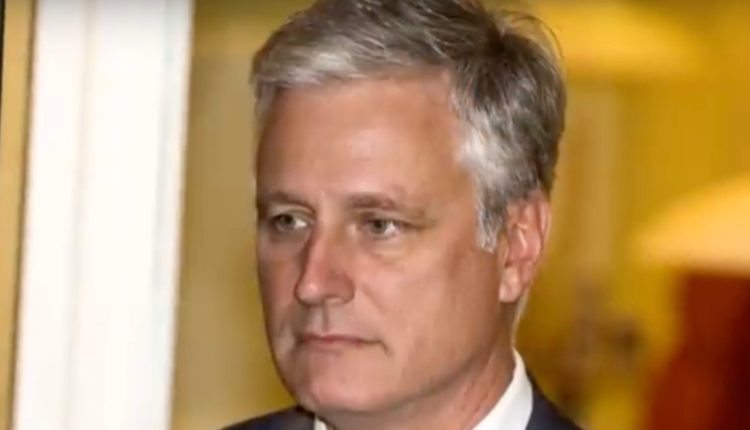 New National Security Advisor Robert C. O'Brien.
New National Security Advisor Robert C. O'Brien.
A new advisor for the same policy
HAVANA – Attorney Robert C. O’Brien was appointed new national security adviser by President Trump. He replaces the controversial John Bolton, whom Trump dismissed via Twitter stating, “I disagreed strongly with many of his suggestions, as did others in the Administration.”
The O’Brien resume does not match up for a job of this magnitude. In 2005, George W. Bush appointed him as an alternate representative to the UN where he spent time but did little. In 2012, he was an advisor to Republican presidential candidate Mitt Romney, and in 2018, he was appointed ambassador in charge of eventual hostage cases, without any incidents taking place.
He has spent most of his time dedicated to his private practice, although he has not been oblivious to political activity. He’s also published a book, “While America Slept: Restoring American Leadership to a World in Crisis.” In 2016 he was among a group of conservative sectors and the current administration who espoused the strategy of “peace through strength.”
Some believe that Mike Pompeo, whose position is strengthened with the dismissal of Bolton, has been the great winner in this palatial bust. The news of the departure of the White House’s ‘Taliban’ was surely celebrated by many, but equating Pompeo as Trump’s Kissinger seems a bit exaggerated. Trump has shown he is his own national security adviser and also his own secretary of state. If Pompeo strays from this assessment, he will join the long list of “excludable” officials.
Although Bolton’s departure eliminates his blustering encouragement of political extremism, it does not signify a sensible change in the foreign policy of the United States. That policy will continue to be applied from the chaotic visions and procedures of the current U.S. president.
This can also be said of major issues such as the relationships with China and Russia, the Middle East, and Europe. It is also true for policy towards Latin America and the Caribbean, especially Venezuela and Cuba, as well as the immigration problem. These are all issues that may have an impact on the 2020 election, Trump’s true priority.
Beyond geopolitical factors, which explain the sustained hostility of previous American presidents towards the revolutionary process in Venezuela, the policy towards that country seems determined by the interest of large oil companies. These pressures, extended over many countries, have enabled the articulation of a campaign that transcends the United States itself.
For different reasons, Russia and Venezuela must have been considered when naming former Exxon head Rex Tillerson Trump’s first secretary of state. After his dismissal nothing changed, just as Bolton’s will not make a difference. Trump will not alienate voters he needs in the 2020 election. There will be no conciliatory surprises with Venezuela like the ones with North Korea.
Cuba’s case is different from that of Venezuela in spite of the solidarity between the two countries. Important economic interests in the United States and internationally do not support the policy of hostility toward Cuba. On the contrary, experience tells us that many interested in the Cuban market supported the steps taken by the Obama administration in the improvement of relations.
The U.S. offensive against Cuba has not had great relevancy in Latin America and the Caribbean, not even by most of the right-wing governments who have tried to preserve their relations with Cuba — and even less in Europe where relations with the Island have improved significantly.
Surely, within a few days, the U.S. government will receive another massive condemnation at the UN for the blockade against Cuba. Perhaps the recent expulsion of two Cuban diplomats before that organization is a message that they don’t care what the world says. That is nothing new in U.S. politics.
Although important ideological differences influence strategic projections by the United States towards Cuba, presently, U.S. policy is determined based on domestic factors related to the state of Florida.
Even Trump once conceded he was more or less in agreement with Obama’s policy toward Cuba. This was the case until he felt he needed the Cuban-American right’s vote. As has become commonplace with Trump, he had no qualms in doing a 180 in direction and speech. That same equation will come into play in next year’s election where Florida will be decisive if he is to be reelected.
O’Brien is a member of the Center for a Free Cuba organization, an anti-Cuban lobby group financed by Bacardí, which has had the support of the National Endowment for Democracy (NED). Therefore nothing good regarding Cuba should be expected from the new national security advisor.
The immigration issue forms the basis of Donald Trump’s electoral agenda. It has had enormous implications for the internal politics of American society, as well as on its foreign policy, especially towards Mexico and Central America. Neither O’Brien nor anyone else will change the course of a policy designed to satisfy the feelings of the hard core Trump voters.
In summary, everything seems to indicate that O’Brien was appointed to behave well and not bother the president with dissenting ideas or protagonist intentions, as was the case with the unpleasant John Bolton.
[Editor’s Note: In an earlier edition we had published that O’Brien was married to a member of the Bacardí family. Not true. We are sorry for our mistake.]


